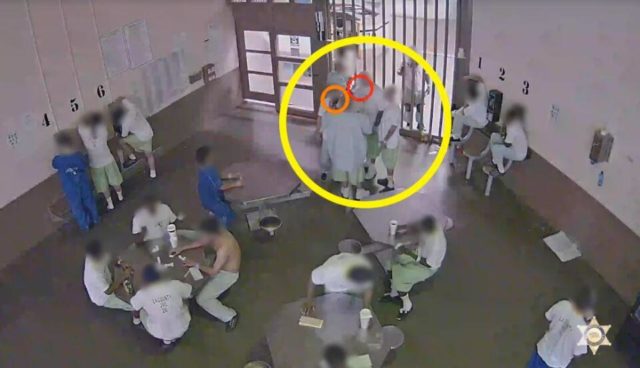Inmates tried to infect themselves with the coronavirus to get early release, says sheriff.
Los Angeles – The Los Angeles County jail inmates had one goal in mind: get infected with the novel coronavirus so they could be released from custody. And they were going to do it together.
One by one last month, groups of inmates inside the North County Correctional Facility in Castaic, California, drank from the same hot-water bottle and sniffed out of one face mask before passing it to the next guy for his turn, according to surveillance footage released Monday by the Los Angeles County Sheriff’s Department.
The county – with 357 positive tests among inmates and an infection total that has more than tripled since the end of April – had previously released some inmates in response to concerns regarding the pandemic.
Los Angeles County Sheriff Alex Villanueva couldn’t immediately explain why a facility that didn’t have a single coronavirus case in mid-April was facing an outbreak a short time later, but he would soon have his answer.
On Monday, Villanueva revealed how an outbreak that resulted in 21 inmates testing positive for the virus in less than a week was part of a coordinated effort on the part of its inmate population to infect each other to get out of jail.
“It’s sad to think that someone deliberately tried to expose themselves to Covid-19,” Villanueva said at the Monday news conference.
“Somehow there was some mistaken belief among the inmate population that if they tested positive that there was a way to force our hand and somehow release more inmates out of our jail environment – and that’s not gonna happen.”
He added: “It’s dismaying and disheartening.”
Covid-19 continues to infect inmates in American jails and prisons at a staggering rate. A recent tally from the Marshall Project last month discovered more than 9,400 reported cases of coronavirus and over 140 deaths among inmates in the United States.
The Federal Bureau of Prisons announced toward the end of April that 70% of inmate tests for the coronavirus have come back positive.
In Los Angeles County, the jails have reduced their population from a maximum of 17,000 to less than 12,000 since the start of the outbreak.
Around the start of the U.S. outbreak in March, the county announced it was releasing inmates with less than 30 days of their sentences remaining to be served to help minimize the spread of the virus.
As of Monday, nearly 4,600 inmates remained quarantined as a precaution, Villanueva said, with almost 2,000 of them located at the jail where the videos were taken.
But some maintain that Los Angeles County is failing its inmate population during the pandemic. A class-action lawsuit filed last month contends that the county jail system, like many across the country, lacks the sufficient space needed for social distancing and isn’t testing inmates when they show symptoms, the Los Angeles Times reported.
Patrisse Cullors, an activist and lead plaintiff in the suit, accused the county of not providing enough soap or an easy way for inmates to dry off. She also described Villanueva’s actions during the pandemic as “an attempt to demonize incarcerated people,” according to the Times.
While it’s unclear if inmates at North County Correctional Facility knew someone was sick when they were sharing water and a mask, the surveillance footage captured groups ignoring social distancing in an effort to try to get the coronavirus, the sheriff said.
In the first video from April 26, an inmate is shown filling a bottle from a hot-water dispenser that’s usually used to cook ramen noodles or make instant coffee.
After walking over to a group of about 20 inmates nearby, several men appeared to be taking turns swigging from the water bottle. Villanueva said that in addition to trying to spread the virus among each other, the inmates were attempting to falsely elevate their temperatures, a symptom of the virus, for a nurse who was checking on them.
Given how inmates “jealously guard” their water cups, the sheriff said the sharing raised flags.
“It’s not something they share person-to-person, and anyone who practices basic hygiene doesn’t do that anyway,” Villanueva said at the news conference.
“So, in this environment, and then considering the fact that the 21 tested positive out of that module, shows what their intention was.”
In the second video, believed to be from mid-April, a small circle of four inmates is shown sharing the same foam cup and taking deep breaths into a shared mask.
When the sheriff’s department was trying to pinpoint what triggered the increase in positive tests, Bruce Chase, the department’s assistant sheriff of custody operations, told the Associated Press that authorities first looked to the video footage for any clues. Officials wanted to see if the inmates were taking social distancing seriously or if they were wearing their masks.
“Lo and behold, we stumbled across footage that was very troubling to us,” Chase said to the AP.
Villanueva said no one involved in the alleged scheme admitted to investigators what they had done.
“I think their behaviour is what convicts them,” he said. It’s unclear if those involved would face any punishment.
Some critics wondered why the inmates were even put in a position to think of a plan. Lex Steppling, director of campaigns and finance for Dignity and Power Now, a grass-roots organisation supporting incarcerated people, told KPCC that the room pictured in the videos made social distancing impossible for inmates.
“The bigger question is, what were they all doing in that room in the first place?” Steppling said.
The Washington Post








